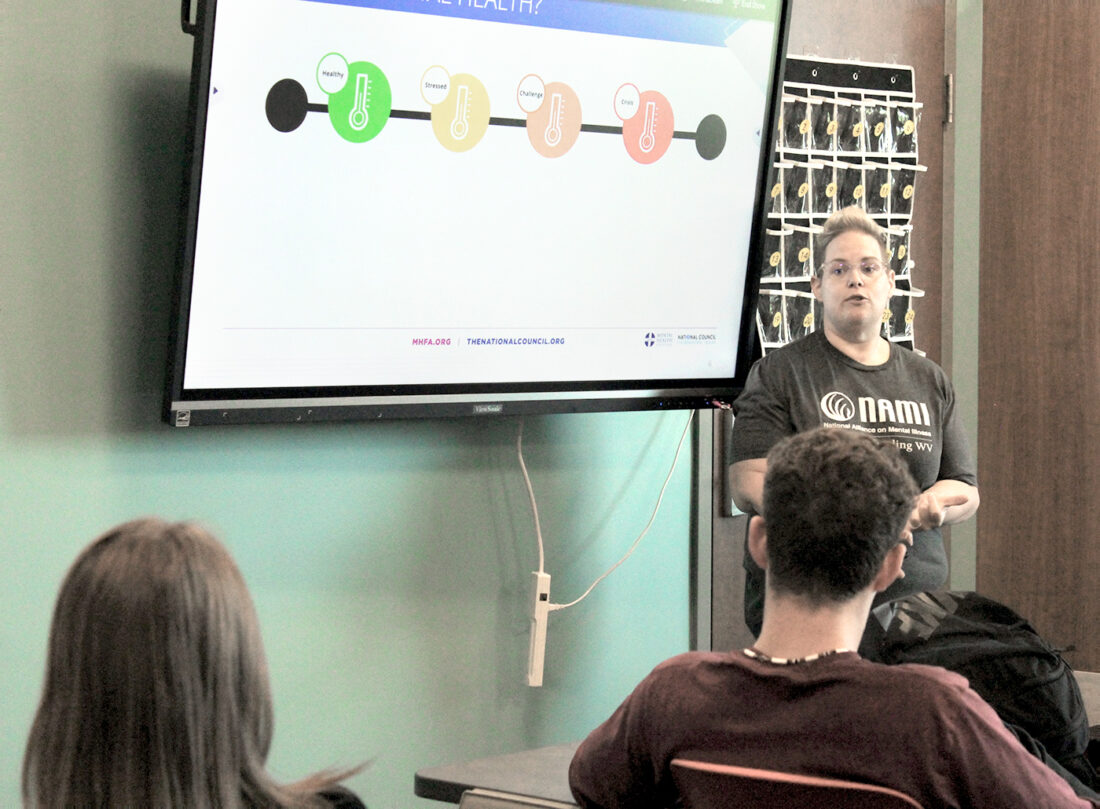Teen mental health first aid sessions get held at ICHS

DISCUSSION — Kayla Straight, peer resource navigator for NAMI of Greater Wheeling, talks to students about mental health first aid during the first of several sessions this week at Indian Creek High School. Straight and Megan Elliott, NAMI family services navigator, will hold sessions this week with further participation by the Josh Merriman Foundation as part of Mental Health Awareness Month. -- Contributed
WINTERSVILLE — May is Mental Health Awareness Month, and Indian Creek High School students are learning how to help themselves and their peers through a series of sessions throughout this week.
The National Alliance on Mental Illness of Greater Wheeling and the Josh Merriman Foundation are visiting the school to address mental health first aid so youth can be a resource for classmates in need. Kayla Straight, peer services navigator for NAMI, kicked off the sessions Monday with an introduction to the topic. She spoke with English classes about the organization and the MHFA program which was founded in Australia and is now in all 50 states.
“We are teaching teen mental health first aid to sophomores through seniors so they know how to help friends deal with mental health challenges or a crisis,” Straight said. “We know teens are talking to their peers before they go to adults, so we hope to give them the tools to help support them and to access care when they need it. We’re trying to break this stigma that comes with mental health.”
Straight has made stops at 15 schools since January, which included a discussion with Indian Creek staff so affected youth have another avenue to obtain help. NAMI serves all 55 counties in West Virginia and Belmont, Jefferson and Monroe counties in Ohio. She touched upon the five-day series, saying topics include identifying mental challenges, obtaining appropriate help, formulating a mental health action plan, dealing with self-injury, panic attacks and other signs and recovery and resilience.
“Most of us know how to do CPR, but this creates awareness to help recognize people with mental health conditions,” she told students. “You are going to your peers long before you go to adults and this will give you the tools to help others.”
Much like physical health, mental health includes a spectrum with levels ranging from healthy, stressed and challenged to crisis. Straight said reframing thinking with a positive outlook can change people’s mindsets for the better. Mental conditions can cause a major change in a person’s normal way of thinking, acting or feeling, interfere with their ability to live their life and last longer than typical emotions or reactions.
Common mental disorders include depression, which may include fatigue, sadness, hygiene and no longer enjoying regular activities; anxiety, which leads to panic attacks, various phobias and obsessive-compulsive disorder; eating disorders such as anorexia, bulimia or overeating; and ADD/ADHD, which may lead to disruptive behaviors. Straight also mentioned psychiatric disorders including schizophrenia, bipolar disorder and mania and said trauma and stress-related disorders like PTSD may be caused by a serious illness, sudden death or other trauma and could lead to substance abuse and risky behaviors.
“One in five youth will experience a mental health challenge by the time they are 18,” she said. “We are seeing a lot of data coming out of COVID that may be closer to one in three or one in two, but we may not know (the true results) for another 15 years. It doesn’t count people older than 18 and of those one out of five youths, about half will not get any sort of help. It’s important that you learn this because people will come to their friends first. People would rather wait 10 to 15 years and suffer in silence before going to a doctor.”
Experts found that there is no singular cause of mental health challenges and it could be a mixture of social, biological and psychological factors. A lack of interaction and friendships, isolation, heredity, biological issues and mind-based matters could all play a role in changes within the psyche.
“We are seeing an influx post-COVID and there are a lot of mental health conditions as a result,” she noted.
She continued that traumatic events early in life can also impact brain development, influence learning, managing emotions and relationships and increase chances of engaging in risky behaviors, plus it can lead to physical and mental health challenges down the road.
During one interaction, Straight asked students if they believed social media could positively or negatively impact mental health. A majority of the pupils said it provided mixed effects or leaned toward the negative, although there were some positives such as communicating with friends, meeting new people and learning about other cultures. One of the negative impacts named was body image issues.
“It’s important to know what’s good and bad for mental health,” Straight said. “You can try to learn how to gauge yourself, follow things that make you happy and use the block button.”
She reiterated that the school provides counselors, therapists and a school resource officer when in need, plus the 988 Suicide and Crisis Lifeline was available by phone, text or direct message and is anonymous and confidential. Other resources include (800) 273-TALK (8255), texting MHFA to 741741 or going online to www.crisistextline.org
Meanwhile, Straight is alternating visits with NAMI representative Megan Elliott for the remainder of the week with officials from the Josh Merriman Foundation on hand Wednesday. The Wintersville-based organization was named for Josh Merriman, a college student who battled depression and committed suicide five years ago. His parents, Bob and Colleen, and friends have raised funds to support concussion awareness, mental health and suicide prevention.



